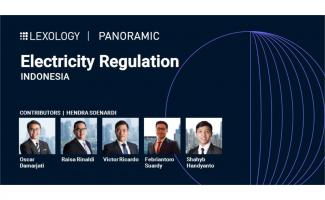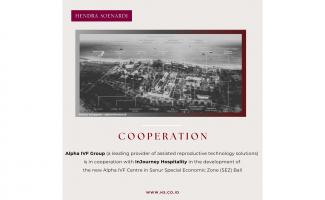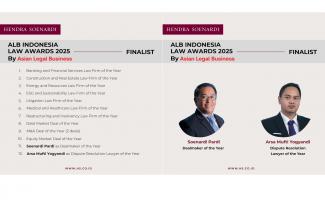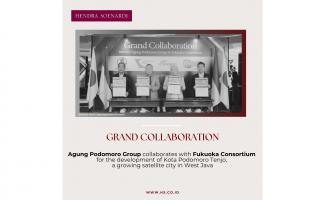View file in pdf version
Written by:
Oscar Damarjati | Raisa Rinaldi | Ainun Ringe Angelina | William Budijaya
Introduction
In June 2020, the Indonesian Government had officially enacted the amendment of Law Number 4 of 2009 of Mining Law (“2009 Mining Law”) into Law Number 3 of 2020 (“New Mining Law Amendment”). In recent years, Indonesia’s mining industry has faced several hurdles and uncertainties that may affect business practices. One prominent challenge is on the issue of Contracts of Work (“COW”) and Coal Contracts of Work (“CCOW”): how the holders of COW and CCOW will continue their business operations in the future? The issuance of New Mining Law Amendment is expected to tackle this key issue as well as other challenges in Indonesian mining industry.
As present, the New Mining Law Amendment is in the process of being reviewed judicially by the Constitutional Court upon petition of certain civil society. The petitioner urges that there is a lack of examination formality of enactment process of the law amendment by the public, regional governments and state-owned companies, hence violating the transparency principle in the legislative process. Nevertheless, the New Mining Law Amendment remains in force.
Point of Changes
The New Mining Law Amendment changes several provisions of the previous Mining Law, amongst others:
1. Centralized Mining Authority
The first key change in the New Mining Law Amendment is the shift to a centralized system where the Central Government is now given the sole authority by the state with respects to mining sector while the authority of Regional Government in regards to mining sector has been revoked. The New Mining Law Amendment also provides a six-month transitional period from the enactment date of the New Mining Law Amendment for the transition of authority from the provincial governments to the Central Government.
As one of the main consequences of such shifting, the Central Government is granted the main authority to issue business licenses for mining sector. The business licenses for mining sector will include (i) business identification numbers (Nomor Induk Berusaha or NIB), (ii) standard certificates and/or (iii) mining licenses (e.g., IUP). Any mining companies must adjust their business licenses (as relevant) to comply with the requirement above no later than 2 (two) years from the enactment date of the New Mining Law Amendment.
2. Mining Licenses
The New Mining Law Amendment simplifies the mining licenses as follows:
- Mining Business License (Izin Usaha Pertambangan or IUP);
- Special Mining Business License (Izin Usaha Pertambangan Khusus or IUPK);
- Community Mining License (Izin Pertambangan Rakyat or IPR);
- Special Mining Business License for the Continuance of Contract Operation (IUPK sebagai Kelanjutan Operasi Kontrak/Perjanjian or Operation Continuance IUPK);
- Rock Mining License (Surat Izin Penambangan Batuan or SIPB);
- Assignment License (Izin Penugasan) for mining activities relating to radioactive minerals;
- Transportation and Sale License (Izin Pengangkutan dan Penjualan);
- Mining Services Business License (Izin Usaha Jasa Pertambangan or IUJP);
- Mining Business License for Sales (Izin Usaha Pertambangan untuk Penjualan or IUP Penjualan).
Pursuant to the above list, certain licenses have been removed by the New Mining Law Amendment. The Exploration IUP (IUP Eksplorasi) and Production Operation IUP (IUP Operasi Produksi) have been removed and merged into a single IUP. There are other licenses that have been removed, namely: (i) Special Production Operation Mining Business License for processing and refining (Izin Usaha Pertambangan Operasi Produksi Khusus untuk Pengolahan dan Pemurnian/IUPOPK Pengolahan Pemurnian) and (ii) Special Production Operation Mining Business License for Transport and Sales (Izin Usaha Pertambangan Operasi Produksi Khusus untuk Pengangkutan dan Penjualan).
3. Mining Areas
The New Mining Law Amendment affirms the Government’s commitment in ensuring that there will be no change in the spatial use and mining areas for which licenses have been issued (Wilayah Izin Usaha Pertambangan or WIUP), Special Mining Business Area (Wilayah Usaha Pertambangan Khusus or WIUPK) and Community Mining Area (Wilayah Pertambangan Rakyat or WPR).
In addition, the New Mining Law changes the maximum areas of WIUP, WIUPK and WPR both in the exploration and production operations stages for some mining commodities. One of the changes that could be positive for mining companies (including COW/CCOW holder - who has obtained a greater area than the maximum area of mining licenses regime under the 2009 Mining Law) is in relation to the maximum WIUPK for metallic minerals and coal commodities in the stage of production operation. Previously, the maximum area for such WIUPK for this case was 25,000 hectares for metallic minerals and 15,000 hectares for coal. Currently, the New Mining Law Amendment has stipulated that the maximum area for such WIUPK will be determined based on MEMR’s evaluation on the development plan proposed by the IUPK holder.
4. Processing and Refining
The New Mining Law Amendment regulates that processing and refining activities that are not integrated with Mining activities are not part of activities regulated/supervised by MEMR. Apart from being shown through the removal of Special Production Operation Mining Business License for processing and refining (IUPOPK Pengolahan Pemurnian), New Mining Law Amendment also regulates that mining companies may conduct integrated processing and refining by themselves or cooperate with: (i) other mining companies who own integrated processing and/or refining facility; or (ii) other parties holding Industrial Business License (IUI) issued by Minister of Industry that carry out processing and/or refining business activity. Furthermore, the New Mining Law Amendment provides that IUPOPK Pengolahan Pemurnian issued before the enactment of the New Mining Law Amendment needs to be adjusted into IUI no later than 1 (one) year after the New Mining Law Amendment comes into force.
5. Mining Activities Conducted by Mining Services Company
Under the 2009 Mining Law, mining services companies were specifically banned from engaging in the “implementation” of mining activities/penambangan. It was interpreted as a prohibition for mining services companies to perform actual coal/mineral extraction activities. Such prohibition was expressly provided in Regulation of the Minister of Energy and Mineral Resources No. 7 of 2020 (“MEMR Regulation 7/2020”), which stipulated that mine extraction (core mine activities) must be conducted by IUP and/or IUPK holders and that mining services companies could only assist in topsoil stripping work.
The New Mining Law Amendment now allows mining services companies to engage in the “implementation” of mining activities. The New Mining Law Amendment removes the existing restriction, which limits the works that can be conducted by mining services companies to “consultation, planning, and equipment testing”, and now, expressly permits activities directly related to “mining”.
6. Reclamation and Post Mining
In order to improve environmental protection, the New Mining Law Amendment imposes an obligation on IUP and IUPK holders to conduct reclamation and post-mining activities with a 100% (one hundred percent) success rate prior to the shrinking stage or return stage of the mine areas. Furthermore, IUP and IUPK holders must hand over the plot of land that has been through a reclamation process and/or post-mining activities process to parties who are entitled through the MEMR.
7. Divestment
The New Mining Law Amendment emphasizes the general rule of 51% divestment obligation. In addition, the New Mining Law Amendments introduces: (i) the possibility of the Central Government jointly with the Regional Government, state-owned enterprise and/or regional-owned enterprise to determine the alternative divestment scheme; and (ii) a possibility of divestment route through Indonesian Stock Exchange.
8. Mining Operation Continuation under COW/CCOW in the form of Operation Continuation IUPK
The New Mining Law Amendment also provides more certainty that the operation of existing COW’s and CCOW’s which will expire may be continued under an Operation Continuation IUPK with following requirements:
a. for up to 20 years (each for a period of up to 10 years) for COW’s/CCOW’s which have not been extended; and
b. for a period up to 10 years, for COW’s/CCOW’s which have already been granted the first extension.
The extensions shall remain subject to the evaluation from Government by taking into account ways to increase state revenue. In this regard, MEMR may also refuse to grant the Operation Continuation IUPK if the evaluation result shows that the COW/CCOW holder did not perform good mining practice.
9. State Property Utilization by Operation Continuation IUPK Holder
With regard to the operation continuation of CCOW in the form of Operation Continuation IUPK, the New Mining Law Amendment includes the provision regulating the utilization of state-owned property (barang milik negara), which was not regulated under the 2009 Mining Law. The New Mining Law Amendment sets out that all properties obtained during the implementation of CCOW that are determined as the state-owned property may remain to be utilized in coal mining activities.
Other Provisions
- Mining Road
The New Mining Law Amendment requires the IUP and IUPK holder to utilize Mining road when carrying out Mining Business activities. The Mining road can be constructed by the IUP and IUPK holders themselves or in partnership/cooperation with other IUP or IUPK holders for building Mining road or any third person who owns road that can be designated as Mining road.
- Transfer of Mining Business Licenses
The New Mining Law Amendment now permits the transfer of IUP and IUPK to third parties, not only to subsidiaries, with the approval of MEMR, provided that the existing holder has (i) completed the relevant exploration activities, as evidenced by data on relevant resources on the reserves; and (ii) fulfilled all administrative, technical, environmental, and financial requirements.
- Transfer of Shares
MEMR approval remains mandatory for the transfer of shares in mining companies, but no MEMR approval will be required for the transfer of shares of listed Indonesian mining companies whose shares are publicly traded on the Indonesian Stock Exchange.
- Encumbrances Prohibition
The New Mining Law Amendment emphasizes the provision in MEMR Regulation 7/2020 regarding the prohibition on IUP and/or IUPK holders encumbering their mining licenses and their products.
- Additional Mandatory Reserve Fund
The New Mining Law Amendment requires IUP and/or IUPK holders entering the production operation stage to allocate a reserve fund. This fund is to be utilized for the discovery of new coal/mineral reserves in the future.
- Minimum Funds for Community Development Programs
Although the 2009 Mining Law already required the IUP and IUPK holders to arrange community development programs, the New Mining Law Amendment provides a further provision that the IUP and IUPK holders must allocate a fund for community development programs, with a minimum amount that is to be determined by MEMR.
- Relaxation of Export Ban of Metal Minerals
The New Mining Law Amendment allows holders of COW, Operation Production IUP, and Production IUPK for metal minerals which have fulfilled certain commitments in relation to processing and refining activities as specified in the New Mining Law Amendment to export their unrefined products in a certain amount within a maximum period of 3 (three) years after the New Mining Law Amendment comes into force.
- Penal Sanctions
The New Mining Law Amendment provides several changes to the 2009 Mining Law regarding penal sanctions for material violations. In general, the New Mining Law Amendment provides for a lesser period of imprisonment, but increases the maximum amount of fine.
Conclusion & Comments
Several details within the point of changes provided under the New Mining Law Amendment still need to be governed through implementing regulations that should be further issued by the Government. From what we have elaborated above, one of the major changes contained in the New Mining Law Amendment would be the centralization of authority. The Central Government intends to play a major role in the mining industry going forward. At present, this issue is in the process of judicial review. The New Mining Law Amendment also provides more clarity to the mining industry, specifically on operation continuation of the COW’s and CCOW’s holders. It will respond to many difficulties faced by the industry in the sales of their products to long term contract customers who need supply certainty. Likewise, bankers and investors should add this weight to the credit warranties of mining companies in general. It is of interest to see the consistency of the New Mining Law Amendment will further be ruled with another implementing regulation to provide for the much-needed clarity and legal certainty.
The writing of this article is also assisted by Kimberly Chrestella (Associate) and Kanz Akram Dzulfiqar (Associate)
Copyright © 2020 HS. All rights reserved.
Disclaimer:
The foregoing material is the property of Hendra Soenardi and may not be used or relied upon by any other party without our prior written consent. The information herein is of general nature and should not be treated as legal advice, nor shall it be relied upon by any party for any circumstance. Specific legal advice should be sought by interested parties to address their particular circumstances.



